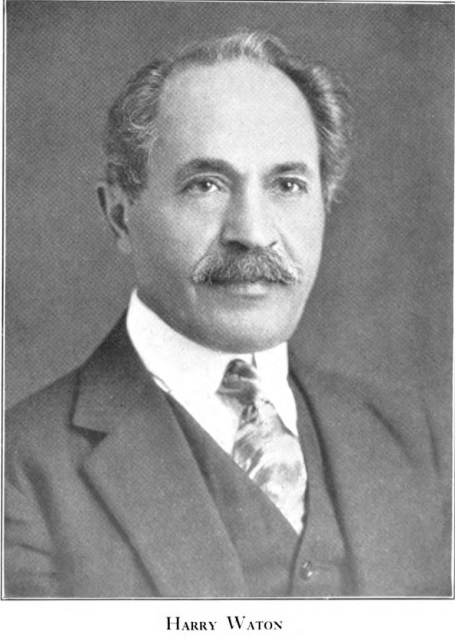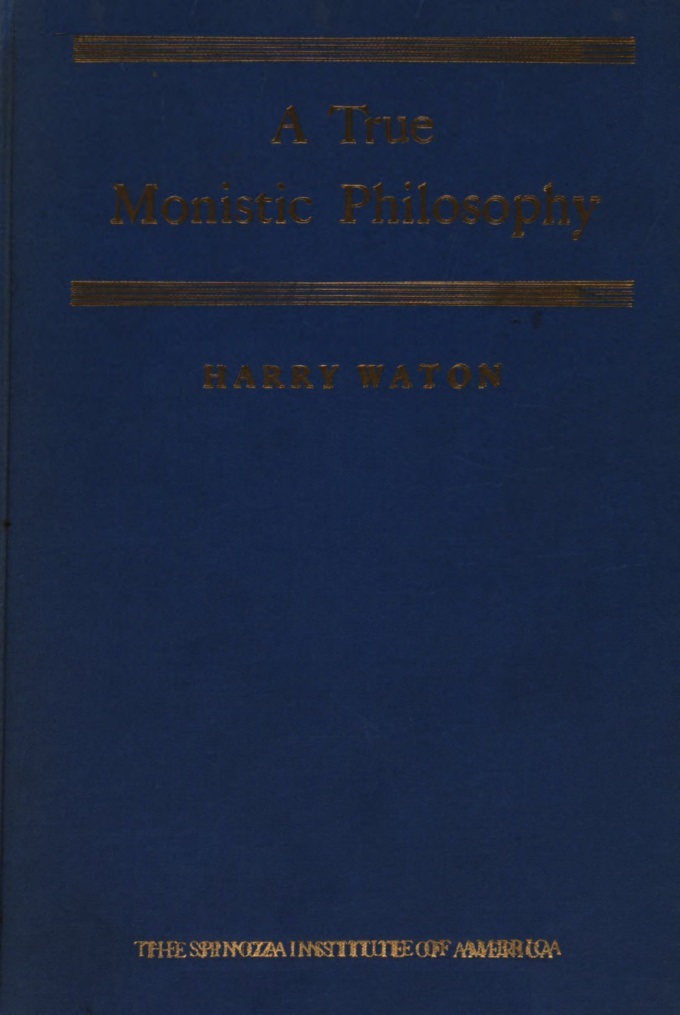Harry Waton (1871 - 1959) kabbalist, marxist, spinozist (merkwaardige -) [2]
 Naar aanleiding van het vorige blog overkwam mij vandaag een aangename verrassing. Ik kreeg nl via het contactformulier een reactie, uit Canada, van de maker van een blog over Constantin Brunner, dat ik al vaker bezocht. Hij was content over mijn recente aandacht voor Constantin Brunner. De aanleiding was echter het blog over Waton. Hij kon mij vertellen dat een goede foto van Harry Waton als frontspice opgenomen is in zijn boek A True Monistic Philosophy. Zoals ik in het vorige blog al zei, is het niet bij books.google te raadplegen, maar – zo vertelde mijn informant – het is wel openbaar gemaakt bij hathitrust.org
Naar aanleiding van het vorige blog overkwam mij vandaag een aangename verrassing. Ik kreeg nl via het contactformulier een reactie, uit Canada, van de maker van een blog over Constantin Brunner, dat ik al vaker bezocht. Hij was content over mijn recente aandacht voor Constantin Brunner. De aanleiding was echter het blog over Waton. Hij kon mij vertellen dat een goede foto van Harry Waton als frontspice opgenomen is in zijn boek A True Monistic Philosophy. Zoals ik in het vorige blog al zei, is het niet bij books.google te raadplegen, maar – zo vertelde mijn informant – het is wel openbaar gemaakt bij hathitrust.org
Dit werd voor mij een aanleiding om nog een blog aan Waton te wijden. Daar het blog gisteren al zo lang geworden was, liet ik daar de bespreking Van Morris Short van dit boek [In: The Journal of Philosophy, Vol. 46, No. 20 (Sep. 29, 1949), p. 654] achterwege, maar die komt nu goed van pas.
Tevens kan ik hier naar voren halen wat ik gisteren, na verder speuren, kon toevoegen aan het eind van dat blog:
Harry Waton is in 1871 in Rusland geboren, in 1891 in de V.S. van Amerika aangekomen, waar hij op 18 juli 1896 het Amerikaans staatsburgerschap verkreeg. Hij verbleef toen in New York. [Volgens de U.S. Naturalization Record Indexes, 1791-1992 cf. hier]. Nu over naar dit boek:
 Harry Waton, A True Monistic Philosophy. Comprehending The Absolute, God, Existence, Man, Society, and History. Vol. I. New York, The Spinoza Institute of America. 1947. xix + 302 pp.
Harry Waton, A True Monistic Philosophy. Comprehending The Absolute, God, Existence, Man, Society, and History. Vol. I. New York, The Spinoza Institute of America. 1947. xix + 302 pp.
Review: “God is conceived as the direct, immediate, and only cause of all existence and all change; however, God himself is completely determined by his own nature. Freedom is taken as the necessity to act in accordance with one's own nature as determined by God (p. 138).
Mr. Waton tells us that a true idea has a historic destiny to realize itself in material form and such destiny "overrides and overrules all plans, schemes and plots of men" (p. xvii). Marxism is such a true idea. Thus, the Russian Revolution and the conquest by Russia of Germany, Italy, "and her allies" against overwhelming odds, are presented as miracles transcending, but making use of, the laws of nature (p. 292). In this apologetic for Marxism, the true monistic philosophy is seen as comprehending both religion and philosophy, neither being adequate alone. Such monistic philosophy begins at the absolute beginning and ends at the absolute beginning of history—that is, with universal communism, which is the manifestation of God in the phenomenal world (p. 155).Our author maintains that "good and evil are correlatives, neither can exist without the other, and each grows and develops in proportion as the other grows and develops" (p. 196). He then counsels unquestioning acceptance of human destiny as determined by God and conceived by Marx, and says that "man should be grateful that God uses him to realize his own purposes" (p. 257). As for the individual himself, "there is no salvation for any individual human being without salvation for all of mankind" (p. 256). [Morris Short].
Zoals ik gisteren ook al meldde verscheen bij het Spinoza Institute of America in 1955 Vol. 2 van dit werk.
______________
Ik plaats hier tevens een link naar de internetpagina van Peter Myers, "Spinoza formulates atheistic Judaism, the religion of Jewish Communists," waarin deze allerlei uitspraken over Spinoza, marxisme en jodendom bijeen bracht, o.a. ook van Harry Waton.

